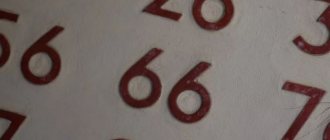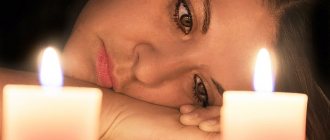The Devil's Dozen is the name given to the number 13. Superstitious people avoid Fridays the 13th, floors and apartments with this number. In some countries, for example in the USA, some buildings do not have a floor with this number. But in Italy, on the contrary, this number is considered lucky. Superstitions, a wary attitude towards the number 13, and belief in mysticism do not yet indicate the presence of a phobia. But if fear prevents a person from living, then, obviously, we are talking about pathological fear. Let's find out what the fear of the number 13 is called, why it occurs, and what to do about it.
What is triskaidekaphobia
Triskaidekaphobia is the fear of the number 13, an irrational fear of this number and everything where it is indicated. An alternative name is terdekaphobia. A similar name is paraskavedekatriaphobia (friggatriskaidekaphobia). This is the fear of Friday the 13th. The phobia is more common in the UK, USA, and Holland. Russians are more resistant to this type of phobia.
It is important! Sometimes fear of the number 13 acts as a symptom of schizophrenia. In this case, the patient suffers from auditory and visual hallucinations. To make an accurate diagnosis and carry out differentiated diagnostics, you need to contact a psychotherapist (psychologist, psychiatrist).
No need to think about the bad
Many people consider 13 to be their lucky number. For example, King Louis XIII of France (the same one who was served by the three musketeers from the novel by Alexandre Dumas the Father). The king specifically waited and married Anna of Austria when she was 13 years old. And one of the greatest chess players of our time, Garry Kasparov, who was born on April 13 and also did not hide his sympathy for this number, became the 13th world champion in this game.
The number 13 is made up of numbers 1 and 3 - they mean success in your career. People who are accompanied by the number 13 throughout life have creative potential and developed intuition. They know how to plan their destiny and implement their plans. Their lucky days are Thursday, Saturday and Sunday, their lucky colors are blue and gray, and their talisman stone is blue sapphire.
It is impossible to talk about any special negative impact of the “devil’s dozen” on the fate of a person under its influence. The main thing is not to attract unhappiness yourself with unnecessary experiences.
Manifestations of phobia
A few days before date X, a person begins to experience anxiety and restlessness. The closer the date, the stronger the fear. Triskaidekaphobe flinches at any rustle, door slam, or phone call. He tries to become invisible, moves around the house as quietly as possible, and does not go outside. The patient refuses to prepare food (he is afraid that using electricity or gas will result in tragedy), tries not to move at all, not to touch anything.
Noticeable somatic manifestations of phobia:
- nausea;
- vomit;
- dizziness;
- feeling of a lump in the throat;
- throat spasm;
- dyspnea;
- shiver;
- chills;
- tremor of the limbs;
- cold sweat;
- gastrointestinal disorder;
- convulsions;
- tachycardia.
If it is necessary to leave the house, if the patient is forcibly removed, he may experience a panic attack or fainting. Other triskaidekaphobes become inadequate and can cause harm to others.
At the behavioral, emotional and psychological level, fear of the number 13 develops gradually. The first signs include the following:
- a person avoids buses with number 13, trams with the same number, houses, etc.;
- a person never chooses 13 seats in cinemas, airplanes, other halls and lounges;
- on this day a person refuses shopping, dating, going to new places;
- on this day the individual leaves all important matters for later, tries to be almost inactive;
- the person does not drive;
- The individual attributes any failures on this day to the machinations of the devil, a fatal number, and completely denies his responsibility and involvement.
If you notice such manifestations in yourself or someone you know, it is recommended to consult a psychologist. At an early stage, the disease can be cured quickly and easily.
Causes of triskaidekaphobia
Most often, fear is associated with belief in mysticism. People are sure that on this day witches gather for a Sabbath, and evil spirits calmly walk around the cities. Patients believe that something bad will definitely happen on this day; failures follow them at every step.
The obsessive thoughts that haunt a person with a phobia are similar to manifestations of OCD. Often it is this disorder that develops as a complication. To protect themselves and relieve anxiety, patients come up with rituals, protective amulets, amulets, etc. Patients try not to leave the house on the 13th or do not get out of bed at all. Other people susceptible to pathology wear special clothing or perform actions that supposedly protect them.
Reasons for demonizing the number 13
Psychologists have still not come to a consensus on the reasons for the demonization of the number 13. It is assumed that this began in the 19th century due to a combination of several prejudices. According to another theory, it all began with the acts of King Philip IV the Fair. On Friday the 13th he started a war with the Templars. Representatives of the order were brutally tortured and then publicly burned in the square.
Religion and folk beliefs
There are other religious and non-religious prerequisites for the formation of a negative attitude towards this figure:
- Judas was the 13th apostle (in America they still believe that if 13 people gather at the dinner table, one of them will die within a year);
- in Tarot cards, 13 means death;
- Satan was the 13th angel before the fall;
- among the Vikings, the god of cunning and deceit was 13, he quarreled 12 other gods;
- ancient peoples considered the number 12 sacred, all numbers larger than it automatically became bad;
- 12 witches gather at the Sabbaths, Satan is the thirteenth participant.
This is interesting! Horror films, for example, the film “Friday the 13th,” made their contribution.
Features of the development of a phobia of a mysterious date
The name of the phobia was proposed by American psychotherapist Donald Dossey. He invented his own method of dealing with irrational fears. In the case of this phobia, the name itself indicates irrationality, this is part of the treatment. Donald had this theory: if the patient could repeat the name of the phobia several times in a row without hesitation, then the fear would go away on its own. There is no exact data on the effectiveness of this method, but some people managed to get rid of fear using this method.
Most often, a phobia is formed in childhood. Children are captivated by mystical stories and believe in miracles. Impressionable adults fall into this same group. If the phobia developed this way, then Donald’s method may well help.
How to get rid of a phobia
It is important to accurately determine the cause of the phobia. To do this, it is better to visit a consultation with a psychologist. Fear can be hidden deep in the subconscious, for example, in childhood a child accidentally saw a horror movie, or parents told a scary story, or religious mom and dad instilled a negative attitude towards a mysterious number. Or maybe one day something bad happened to a person on that day, and the psyche, as a defense mechanism, attributed everything to the number on the calendar and the day of the week. In any case, therapy involves professional and independent treatment.
Getting rid of a phobia on your own
For self-medication, it is recommended to use the desensitization method. This means a gradual rapprochement with fear. Enlist the support of your loved ones and gradually increase the time of contact with the frightening object. Consciously stop at the number 13, for example, stop reading at chapter 13, assign something for the 13th, etc. Record the events of your day, observe, find out that nothing terrible happened. If troubles happen, find a rational explanation and accept your responsibility.
Calm down with breathing therapy, relaxation, meditation. If the fear becomes very strong, then distract yourself with something pleasant. Think in advance what it will be. The stimulus must be positive and strong.
In addition, it is important to develop critical thinking and abandon superstitions. To do this, you need to read scientific literature, watch documentaries, and communicate with educated people. Write down all your superstitions and prejudices and find a scientific explanation for each of them.
Psychologist's advice
Work with a specialist takes place in three stages: education, consultation, correction. For uncomplicated cases, 12–14 sessions are sufficient.
For complicated phobias, the following methods are used:
- NLP;
- rational psychotherapy;
- hypnosis;
- cognitive behavioral psychotherapy;
- shock therapy.
It is important! For severe anxiety, aggressiveness, sleep problems, and hallucinations, the patient is prescribed medications. These can be sedatives, tranquilizers, antipsychotics, beta blockers, antidepressants.
Treatment of the disorder
Letting the disease take its course is dangerous. A severe attack of fear can cause a stroke or heart attack. In addition, in advanced cases, the patient can be dangerous not only to himself, but also to others. A qualified doctor will help you quickly cope with increased anxiety. The person will begin to live a full life again.
Help from a psychotherapist
During the consultation, the specialist determines the cause of the phobia.
He helps the patient find answers to questions about how to cope with difficulties and behave in a critical situation. In the course of work, the patient increases his own self-esteem and improves relationships with others. And also his increased anxiety gradually decreases and then completely disappears. In some cases, doctors prescribe medications to patients. To treat phobias, drugs from the following groups are used:
- Antidepressants.
- Beta blockers.
- Neuroleptics.
- Tranquilizers.
After taking the medications, the patient feels relief. Fear is dulled due to the slowing down of excitation processes in the cerebral cortex. Hope is born that the phobia has been defeated. Pharmaceutical companies make a lot of money from this.
Unfortunately, medications do not eliminate the cause of the phobia. After stopping the medication, the fears return completely. Therefore, drug treatment can only be used as an addition to the main one, which is working with a psychotherapist.
If the patient limits himself to only taking potent substances, he may develop psychological and physical dependence on them. Memory will also deteriorate and aggression will increase.
Psychological assistance consists of three stages: psychological education, counseling and correction. Treatment is a two-way process of information exchange. Most often, 12-14 sessions are enough for a complete cure. In more severe cases, the following may be used:
- rational psychotherapy;
- neurolinguistic programming;
- cognitive behavioral therapy;
- hypnosis;
- extreme training.
Consequences and danger of phobia
What are the consequences of a phobia? Depression, neurosis, panic attacks and aggression, psychosomatic diseases are the tip of the iceberg. An illness prevents a person from living. The everyday life of a triskaidekaphobe boils down to the fact that he looks for a mysterious number everywhere. It comes to the point that he sums up several numbers and if their sum is 13, then the person attributes these numbers and everything connected with them to the machinations of the devil. Sooner or later, everything that surrounds the patient becomes dangerous and scary in his perception. He quits his job, loses his friends, and doesn’t go out. But even at home, anxiety does not leave the patient.
One of the prominent representatives of triskaidekaphobes was Arnold Schoenberg, an Austrian composer. He was born on the 13th, but was terrified of this date and was sure that he would die on the same day. The composer even indicated the exact age - 76 years (13 in total). Arnold was not sick with anything, he felt great, but that day he refused to get out of bed and began to wait for death. 13 minutes before his new year in life, he died. Psychologists do not believe in mysticism and are confident that in this case, self-hypnosis, the nocebo effect, worked. This is the main danger of a phobia.
It is important! There are cases when the fear due to the expectation of misfortune was so strong that patients committed suicide or died of a heart attack right in their bed.
Help for loved ones
If a loved one suffers from triskaidekaphobia, they need support. It is important to maintain high-quality conversations in which you need to fully understand the patient’s experiences and fears. There is no need to devalue or ridicule the feelings of your interlocutor. The following statements are especially hurtful:
- "It's all nonsense! Don't create problems for yourself."
- "You are crazy! Come to your senses"
- “Just don’t think about it and you’ll forget everything.”
It is especially dangerous to organize various pranks with the number 13 and joke about this topic in every possible way. There are known cases of suicides due to received envelopes with the number 13 or various innocent people, as it seemed to the sources of the jokes.
The best way to provide help and support is to understand the seriousness of the situation for the person with this disorder. It is important to be there and guide the patient in a positive direction. During panic attacks, it is worth reminding the person about breathing, pointing out that nothing has happened or will happen from the appearance of this number, and try to have constructive conversations in favor of rational attitudes.
If the situation gets out of control and the symptoms of a phobia become too painful and regularly use the services of a qualified psychologist and psychotherapist - Andrey Filippov. Consultations can take place in the office or online. If the recommendations are followed, a sustainable result from the treatment is guaranteed. Remember that mental health is an important component of taking care of your health!











